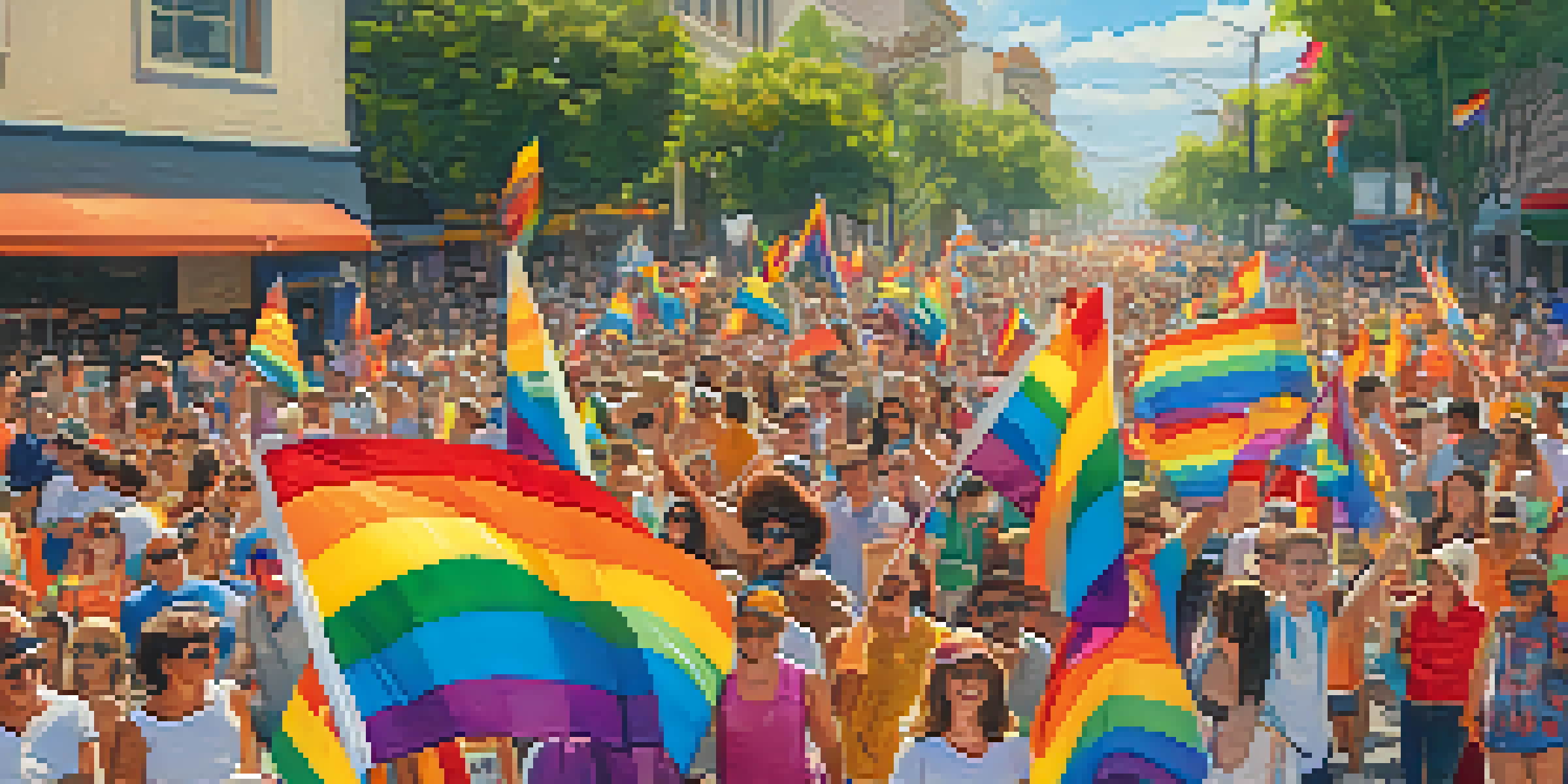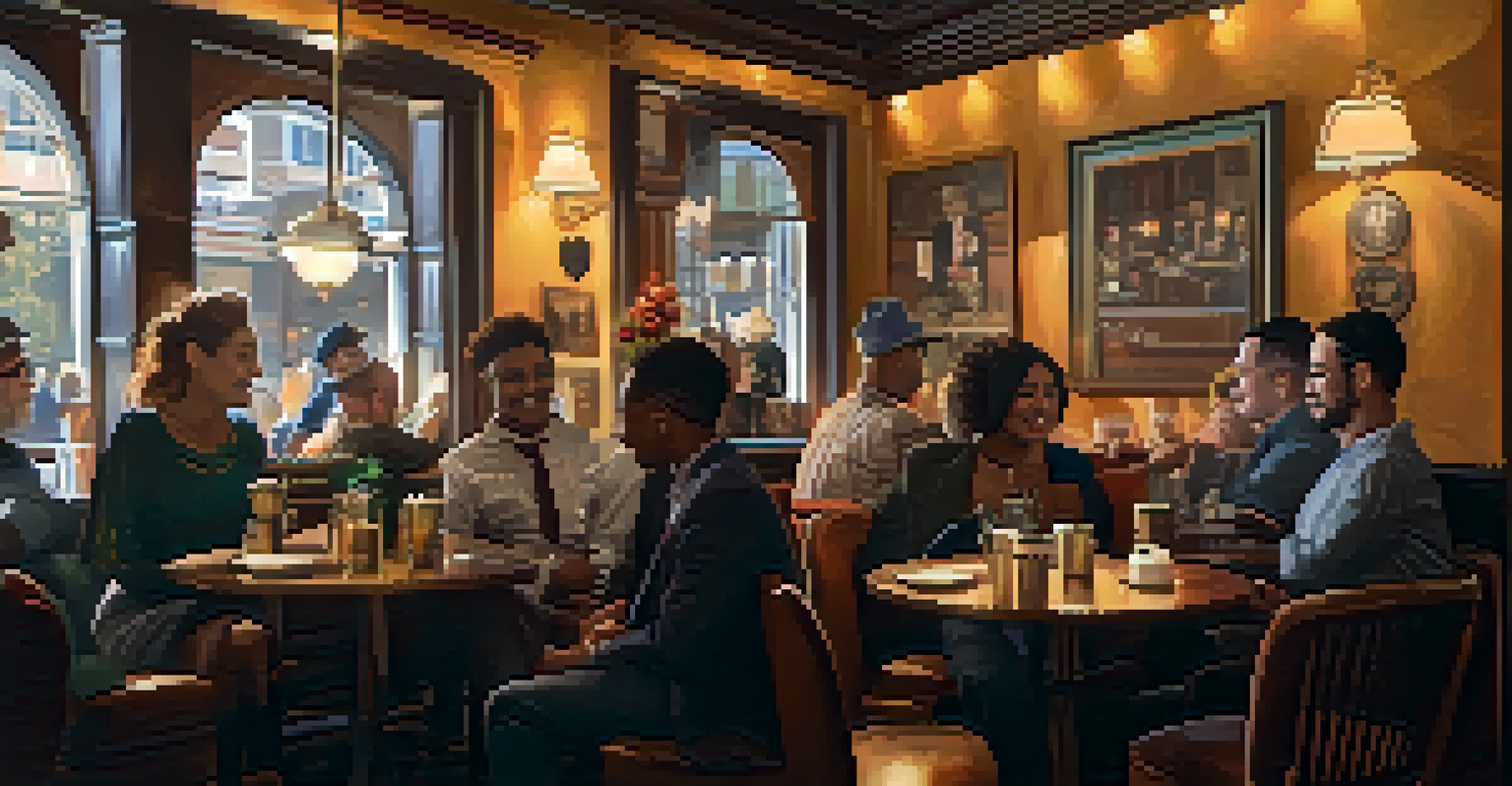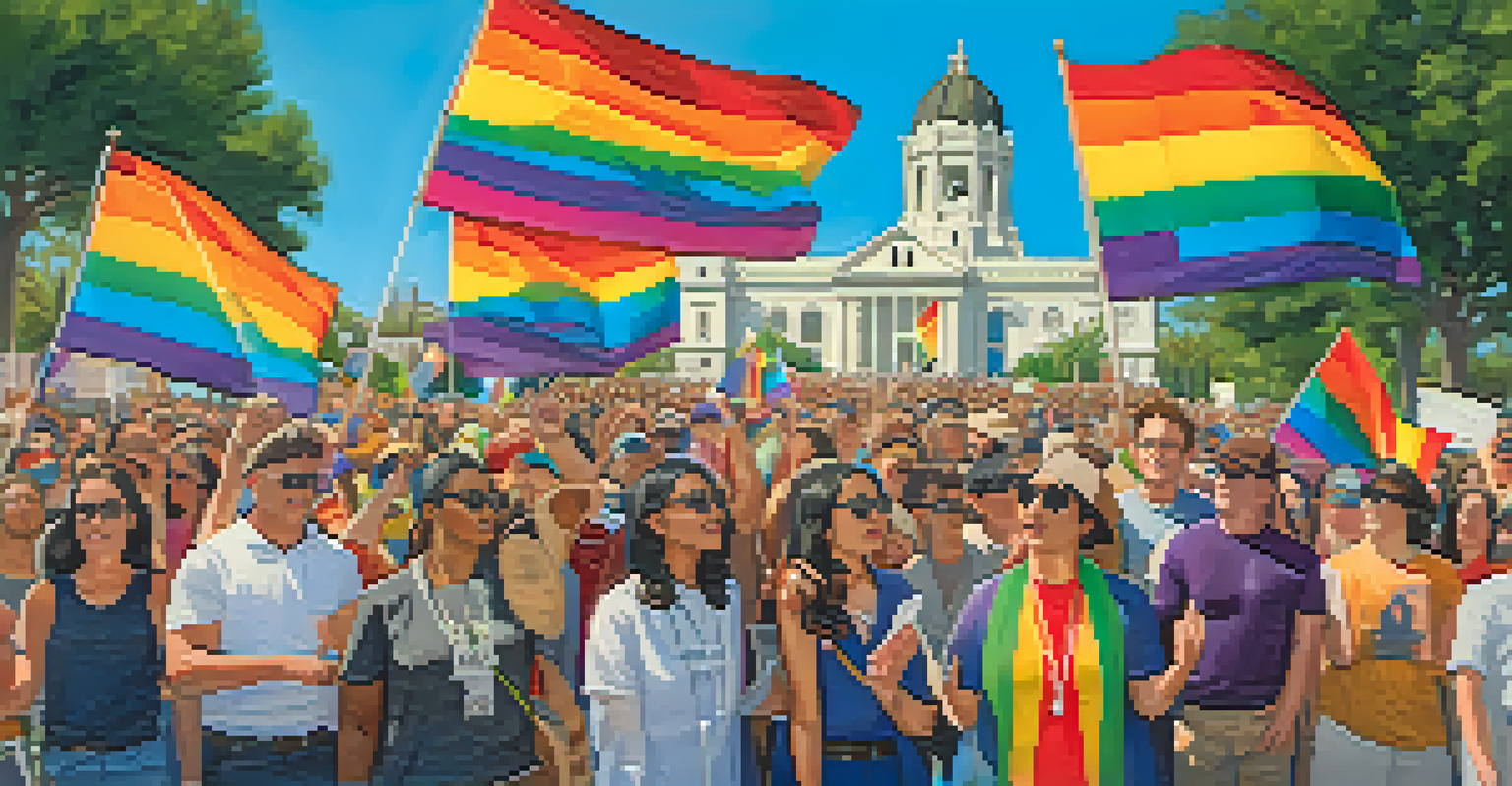History of Pasadena's LGBTQ+ Community: A Journey Through Time

Early Days: The Roots of Pasadena's LGBTQ+ Community
Pasadena, like many cities, has a rich tapestry of history that includes its LGBTQ+ community dating back to the early 20th century. In those days, social gatherings often took place discreetly, as homosexuality was largely taboo. Despite societal pressures, small groups formed bonds in cafes and clubs, laying the groundwork for a more visible community in the years to come.
The beauty of standing up for your rights is that you never have to stand alone.
One notable spot was the legendary Café Society, which became a haven for queer individuals seeking acceptance and camaraderie. These early meetings were vital in fostering a sense of belonging, as they provided a safe space for people to express themselves without fear of judgment. As the city evolved, so too did the community, slowly beginning to carve out a more prominent place in Pasadena's social landscape.
As the decades rolled on, the seeds planted in those early days would flourish into a more organized movement. Activism and advocacy began to take shape, with individuals from diverse backgrounds coming together to fight for their rights and visibility, marking the beginning of a pivotal journey.
The 1960s: A Time of Change and Activism
The 1960s marked a significant turning point for the LGBTQ+ community across America, and Pasadena was no exception. Inspired by broader civil rights movements, local activists began to speak out against discrimination and inequality. This decade saw the emergence of organizations that aimed to unite the community and challenge societal norms.

One of the most notable events was the formation of local chapters of national LGBTQ+ organizations. These groups played a crucial role in educating the public, organizing rallies, and lobbying for legal reforms. The Stonewall Riots in 1969 ignited a fire across the nation, encouraging Pasadena's community to stand up and make their voices heard.
Pasadena's LGBTQ+ Roots and Growth
The LGBTQ+ community in Pasadena has evolved from discreet gatherings in the early 20th century to a vibrant and visible community that celebrates diversity and advocacy.
As activism gained momentum, so did the presence of LGBTQ+ culture in Pasadena. The arts flourished, with local artists using their talents to express the struggles and triumphs of the community. This period was instrumental in shaping the identity of Pasadena's LGBTQ+ residents, fostering a sense of pride and resilience.
The 1970s: Pride and Visibility Emerge
As the 1970s rolled in, the LGBTQ+ community in Pasadena began to thrive with newfound visibility and pride. The first Pride events took place, celebrating love, diversity, and the fight for equality. These gatherings not only uplifted the community but also educated the broader public about LGBTQ+ issues, fostering understanding and acceptance.
We are not what we were born, but what we choose to become.
Local businesses began to openly support LGBTQ+ events, showcasing a shift in societal attitudes. Bars, bookstores, and community centers became gathering places for queer individuals, further solidifying the sense of community. The establishment of social networks helped to create a more connected and empowered group, ready to face the challenges ahead.
During this time, Pasadena also witnessed the rise of LGBTQ+ representation in local media. Publications began to highlight community stories and issues, creating a platform for voices that had long been silenced. This era was a transformative time, laying the groundwork for future generations to continue the fight for equality.
The 1980s: The AIDS Crisis and Community Resilience
The 1980s brought profound challenges to the LGBTQ+ community, particularly with the emergence of the AIDS crisis. Pasadena was not immune to the devastating effects of the epidemic, which claimed countless lives and left many families shattered. In response, the community rallied together, forming support networks and advocacy groups to aid those affected.
Organizations such as the AIDS Service Center emerged, providing crucial resources and care to individuals and families impacted by the disease. These groups not only offered practical support but also worked tirelessly to combat the stigma surrounding AIDS, educating the public about the virus and promoting compassion and understanding.
Activism and Cultural Transformation
Throughout the decades, Pasadena's LGBTQ+ community has engaged in activism and cultural expression, significantly shaping its identity and pushing for equality.
This period, while marked by sorrow, also showcased the resilience of the LGBTQ+ community in Pasadena. The strength displayed during these difficult times fostered deeper connections among residents, as they united in their shared struggles and victories. The fight against AIDS became a rallying cry for activism and awareness, further solidifying the community's commitment to social justice.
The 1990s: Cultural Expansion and Continued Advocacy
As the 1990s unfolded, Pasadena's LGBTQ+ community continued to grow and diversify, with a vibrant cultural scene emerging. Pride celebrations became larger and more inclusive, drawing in allies and supporters from all walks of life. This decade saw the introduction of various cultural events, including film festivals, art shows, and pride parades, which showcased the richness of LGBTQ+ creativity.
Additionally, the 1990s were marked by significant legislative efforts to advance LGBTQ+ rights. Activists in Pasadena worked diligently to address issues such as discrimination and hate crimes, advocating for protections at local and state levels. The community's determination to fight for equality began to gain traction, leading to meaningful changes in policies.
The rise of technology also played a role in connecting the LGBTQ+ community. Online forums and social networks emerged, allowing individuals to share experiences and build relationships. This technological shift opened doors for dialogue and collaboration, strengthening the community bonds that had been forged over the decades.
The 2000s: Legal Progress and Community Pride
The 2000s marked a pivotal era for LGBTQ+ rights in Pasadena, as legal progress began to take center stage. The fight for marriage equality gained momentum, with activists rallying for the rights of same-sex couples. In 2008, Pasadena celebrated the first same-sex marriages, a monumental moment that signified years of hard work and dedication.
This decade also saw a rise in LGBTQ+ visibility in politics, with more community members stepping into leadership roles. Local officials and organizations began to recognize the importance of inclusivity, leading to initiatives that promoted equal rights and protections for all residents. The community's voice was becoming increasingly powerful and respected.
Resilience Amid Challenges
Despite facing adversities such as the AIDS crisis and rising anti-LGBTQ+ sentiment, Pasadena's LGBTQ+ community has demonstrated remarkable resilience and commitment to social justice.
As pride events grew in size and spirit, they became a symbol of resilience and celebration. The LGBTQ+ community in Pasadena embraced its identity, with parades, festivals, and educational events that highlighted the richness of diverse experiences. This period was a testament to the journey of acceptance and the ongoing quest for equality.
The 2010s: Intersectionality and New Challenges
The 2010s ushered in a new wave of awareness regarding intersectionality within the LGBTQ+ community. Activists began to emphasize the importance of recognizing the unique experiences of individuals from different backgrounds, including those of various races, genders, and socioeconomic statuses. This focus on inclusivity enriched the community and fostered a deeper understanding of shared struggles.
Pasadena's LGBTQ+ organizations expanded their reach, working to address issues such as homelessness, healthcare, and discrimination within marginalized groups. By prioritizing intersectionality, the community forged alliances with other social justice movements, creating a broader coalition for change. This collaborative approach was key in tackling the complexities of inequality.

Despite significant progress, the 2010s also presented new challenges, including rising anti-LGBTQ+ sentiment in certain areas. The community responded with resilience, organizing rallies and educational campaigns to counteract hate. The fight for acceptance continued, as Pasadena's LGBTQ+ community stood united in the face of adversity, committed to forging a more equitable future.
Today: Celebrating Achievements and Looking Ahead
Today, Pasadena's LGBTQ+ community stands as a testament to resilience, pride, and advocacy. With a rich history marked by both struggles and triumphs, the community continues to thrive, celebrating its achievements while remaining vigilant against ongoing challenges. Pride events now attract thousands, showcasing the diversity and vibrancy of the LGBTQ+ community.
Local organizations remain active, focusing on issues such as mental health, youth support, and policy advocacy. The community also emphasizes the importance of education and awareness, ensuring that future generations understand the significance of their history. This commitment to knowledge and activism fosters a sense of responsibility to protect the rights won through years of struggle.
As we look ahead, the journey of Pasadena's LGBTQ+ community is far from over. The fight for equality and acceptance continues, with new generations stepping up to advocate for their rights and the rights of others. Together, they honor the past while paving the way for a brighter, more inclusive future for all.